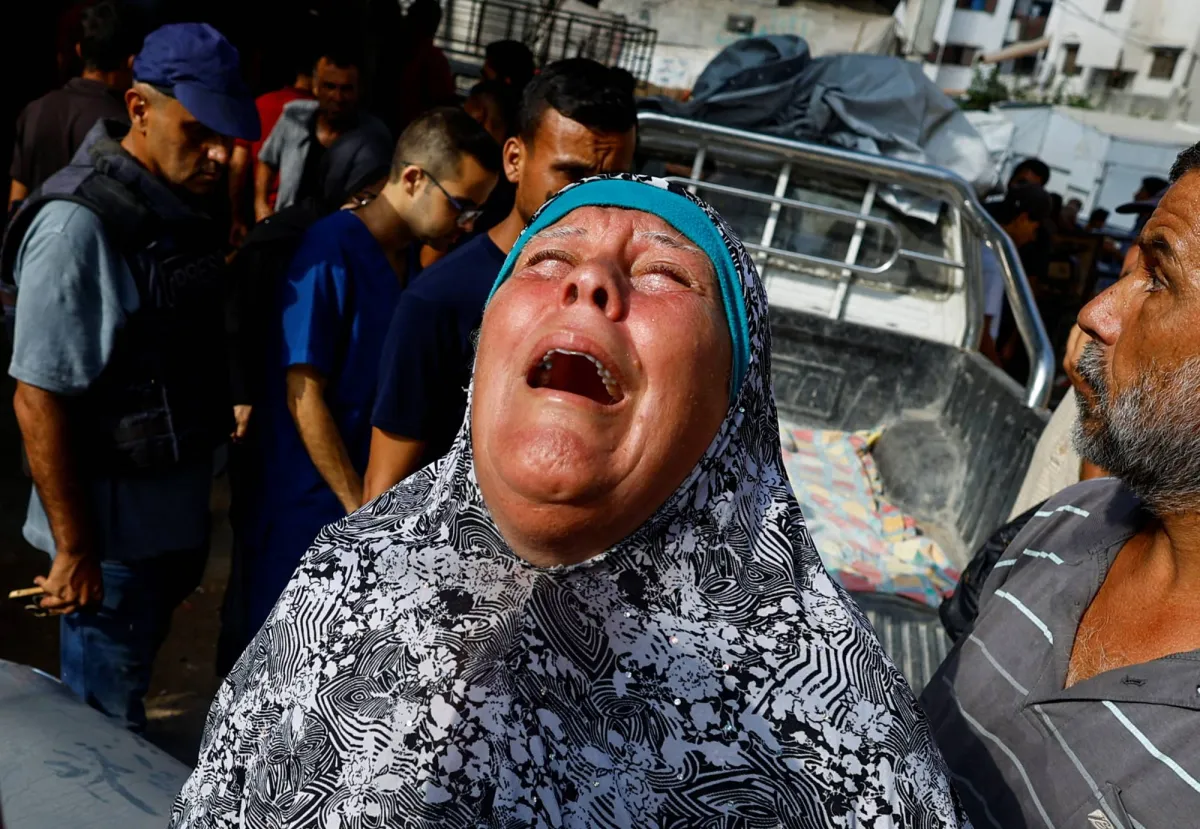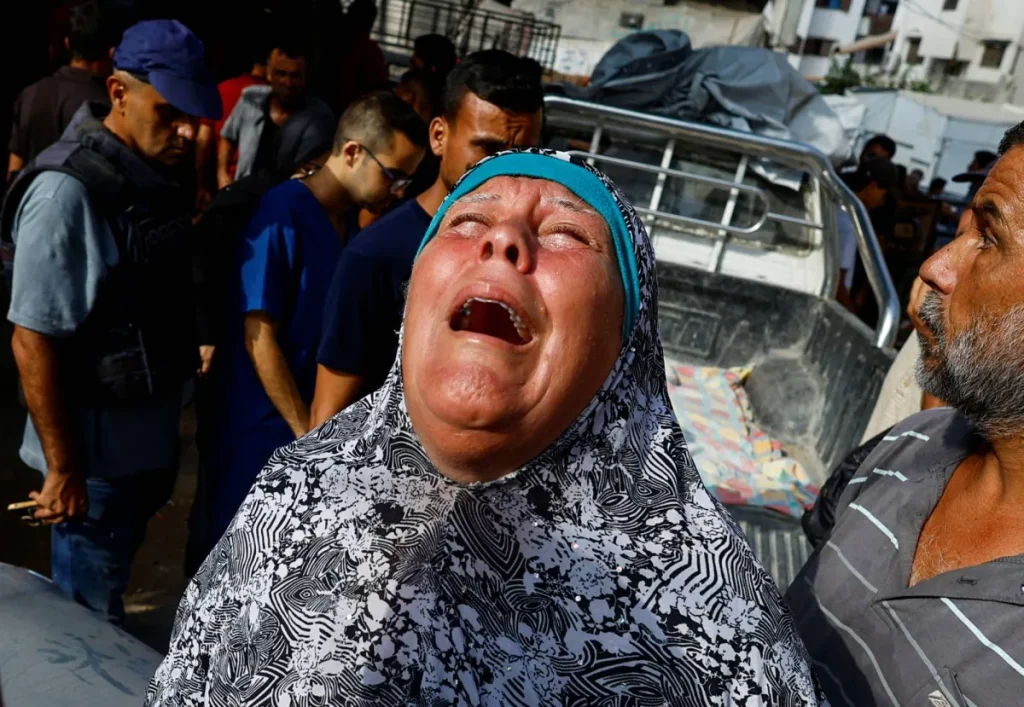A Palestinian woman weeps during the funeral of those killed by Israeli fire while seeking food aid in Gaza City on Saturday (Reuters).
After a tense session, described by some as showing clear disagreements between some Palestinian factions on one side and Hamas on the other during a meeting held in Cairo, the movement’s stance has shifted towards a deal to prevent Israel from implementing its plan to occupy Gaza City and force nearly a million Palestinians to flee again to the southern sector.
Palestinian sources familiar with Hamas and outside it told Asharq Al-Awsat that the negotiating delegation led by Khalil al-Hayya informed mediators in Egypt and Qatar of the movement’s readiness to return to the ceasefire agreement proposal for 60 days, as presented in its latest updated version by the mediators, specifying locations for Israeli troop redeployment and the release of 10 Israeli hostages, with final stage negotiations to begin immediately after this phase is implemented.
According to the sources, Hamas has put the ball entirely in Israel’s court to decide on accepting the proposal, which it had initially accepted before submitting amendments. By officially informing the mediators of its new position, Hamas means it has withdrawn the amendments it made regarding withdrawal and some issues related to the release of Palestinian prisoners from the movement and its military wing.
The sources say the movement took this stance not due to pressure from Palestinian factions but out of a sense of necessity to stop Israel’s plan to occupy Gaza City and displace its residents again, making the city and its northern part fully controlled by Israel, effectively emptying it of its population and possibly resettling it with settlements as part of a broad Israeli plan affecting Gaza and the West Bank amid new plans announced by the extremist Israeli Finance Minister Bezalel Smotrich.
Turkey, Qatar, and Egypt have informed the United States of the negotiating delegation’s new position, and there is movement aimed at pressuring to resume negotiations based on this to reach a second phase aiming to completely stop the war within a comprehensive deal.
It is unclear how Israel will respond to Hamas’s new position, especially as it and the United States agreed to proceed with a new plan primarily aimed at reaching a comprehensive deal at once, including releasing all hostages, disarming Hamas and factions, removing Hamas from the political scene for the post-war period, and seeking an alternative authority to govern the sector.
Channel 12 reported that an official document showing Hamas’s readiness to reach an immediate partial deal was presented to Israeli Prime Minister Benjamin Netanyahu. Security chiefs and some government officials support this option over further military plans that could affect the hostages’ lives.
According to the document, Hamas changed its positions it had presented three weeks ago that caused the collapse of talks. Security chiefs emphasized the need to exploit the new opportunity formed by the movement’s retreat from its amended positions on the latest proposal.
According to Yedioth Ahronoth, mediators conveyed to Israel a message that Hamas is currently ready for a partial deal, urging Tel Aviv to return to negotiations after their recent collapse. There are differing views within Israel regarding the change in Hamas’s position; some see it as a political maneuver to stop the Gaza occupation plan, while others believe Israel should not delay negotiations on a partial deal that could lead to the release of 10 hostages alive and save them from extraordinary conditions, as their lives are truly at risk.
Israeli National Security Council head Tzachi Hanegbi and security chiefs, including Mossad chief David Barnea, support the partial deal idea, while the head of the negotiating delegation, Strategic Affairs Minister Ron Dermer, opposes it and rumors suggest he might resign from leading the delegation.
Estimates in Israel indicate that if Hamas is ready to enter negotiations on a partial agreement, the decision will be made by the smaller political-security cabinet (the ‘kabinett’).
Israeli military operations continued on land and air, with ground forces advancing more in parts of southern and western Al-Zeitoun and Al-Sabra neighborhoods, south of Gaza City, while demolitions of homes and buildings continued in those areas, as well as in central, southern, and northern Khan Younis in the southern sector.
Israel began its operation in Al-Zeitoun and Al-Sabra neighborhoods unofficially days ago before officially announcing it on Friday evening, seemingly as part of occupying Gaza City and separating it from the central and southern sector.
Since dawn Saturday until the afternoon, at least 20 Palestinians were killed in a series of airstrikes, some targeting tents of displaced people in Khan Younis and Gaza City, while about nine waiting for aid in the northern and central sector were killed.
The body of journalist Marwa Muslim was recovered after 44 days of bombing her home in Al-Tuffah neighborhood, along with five of her siblings who were killed with her.
Humanitarian conditions continue to worsen amid ongoing looting of aid entering the sector and the lack of secure distribution to those in need.
According to Gaza’s Ministry of Health, 11 deaths due to starvation and malnutrition, including a child, were recorded in the past 24 hours, raising the total victims of starvation and malnutrition to 251, including 108 children.














Recommended for you
Exhibition City Completes About 80% of Preparations for the Damascus International Fair Launch
Talib Al-Rifai Chronicles Kuwaiti Art Heritage in "Doukhi.. Tasaseem Al-Saba"
Unified Admission Applications Start Tuesday with 640 Students to be Accepted in Medicine
Egypt Post: We Have Over 10 Million Customers in Savings Accounts and Offer Daily, Monthly, and Annual Returns
Al-Jaghbeer: The Industrial Sector Leads Economic Growth
His Highness Sheikh Isa bin Salman bin Hamad Al Khalifa Receives the United States Ambassador to the Kingdom of Bahrain